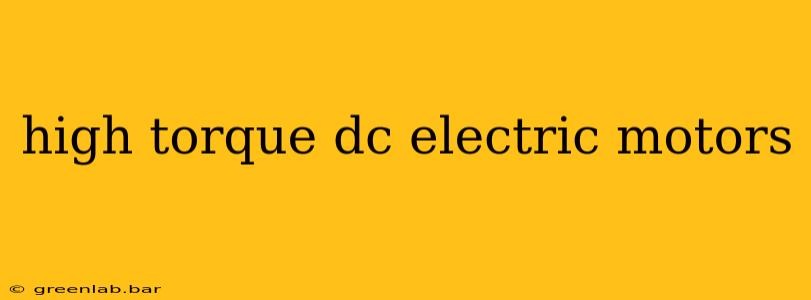High torque DC electric motors are workhorses in various industries, providing the raw power needed for demanding applications. Understanding their capabilities, applications, and key features is crucial for engineers and anyone involved in selecting the right motor for a specific task. This comprehensive guide delves into the world of high torque DC motors, exploring their intricacies and providing valuable insights.
What Makes a DC Motor Deliver High Torque?
Torque, the rotational force a motor produces, is paramount in applications requiring significant pulling or turning power. Several factors contribute to a DC motor's high torque output:
-
Strong Magnetic Field: A powerful magnetic field, generated by strong permanent magnets or powerful electromagnets, is essential. This field interacts with the motor's armature windings to produce the torque. Higher field strength translates directly to higher torque.
-
Large Armature: A larger armature diameter allows for more windings, increasing the motor's torque-producing capacity. This is because the torque is directly proportional to the current flowing through the windings and the magnetic field strength.
-
High Current Capacity: The ability to handle high currents without overheating is crucial. High-torque motors often employ robust windings and efficient heat dissipation mechanisms to manage the increased current demands.
-
Gear Reduction: While not inherent to the motor itself, gear reduction systems are frequently used to amplify torque. A gearbox effectively increases the rotational force at the output shaft, allowing for heavier loads to be driven.
-
Motor Type: Different types of DC motors, such as permanent magnet DC (PMDC) motors and separately excited DC motors, have varying torque characteristics. The choice of motor type depends heavily on the specific application requirements. For example, PMDC motors are often preferred for their simplicity and cost-effectiveness, while separately excited DC motors offer greater controllability and efficiency in certain applications.
Applications of High Torque DC Motors
The exceptional torque output of these motors makes them ideal for a wide range of applications, including:
Industrial Automation:
- Robotics: High torque is essential for precise and powerful movements in robotic arms and manipulators.
- Conveyor Systems: Moving heavy materials efficiently requires motors capable of delivering consistent high torque.
- Material Handling: Applications such as lifting, pulling, and pushing heavy objects demand significant torque.
Automotive:
- Electric Vehicles: While AC motors are prevalent, high torque DC motors find applications in specific vehicle systems requiring high starting torque or precise control.
- Power Steering: Providing the necessary force to assist steering, especially in larger vehicles.
Other Applications:
- Electric Winches: Hoisting and pulling heavy loads in construction, marine, and other industries.
- Printing Machinery: Precise control and high torque are necessary for the intricate movements in printing presses.
- Medical Equipment: Certain medical devices need high-torque motors for accurate and powerful operation.
Choosing the Right High Torque DC Motor
Selecting the appropriate high-torque DC motor involves careful consideration of various factors:
-
Torque Requirements: Determining the exact torque needed for the application is paramount. Oversizing can lead to unnecessary cost and inefficiency, while undersizing can lead to performance limitations.
-
Speed Requirements: The desired speed of operation influences motor selection. High-torque motors might have lower speeds compared to high-speed motors.
-
Duty Cycle: Understanding the motor's operational duty cycle (the percentage of time the motor is running) is crucial for selecting a motor with adequate thermal capacity.
-
Power Supply: The available power supply dictates the motor's voltage and current ratings.
-
Environmental Factors: Operating conditions, such as temperature, humidity, and dust, impact the choice of motor enclosure and construction.
Conclusion
High torque DC electric motors are powerful tools critical for a wide range of demanding applications. By carefully considering the factors discussed above, engineers and technicians can select the right motor to ensure optimal performance, reliability, and efficiency in their projects. The ongoing advancements in motor technology promise even greater torque density and efficiency in the future, opening up new possibilities for innovative applications.

